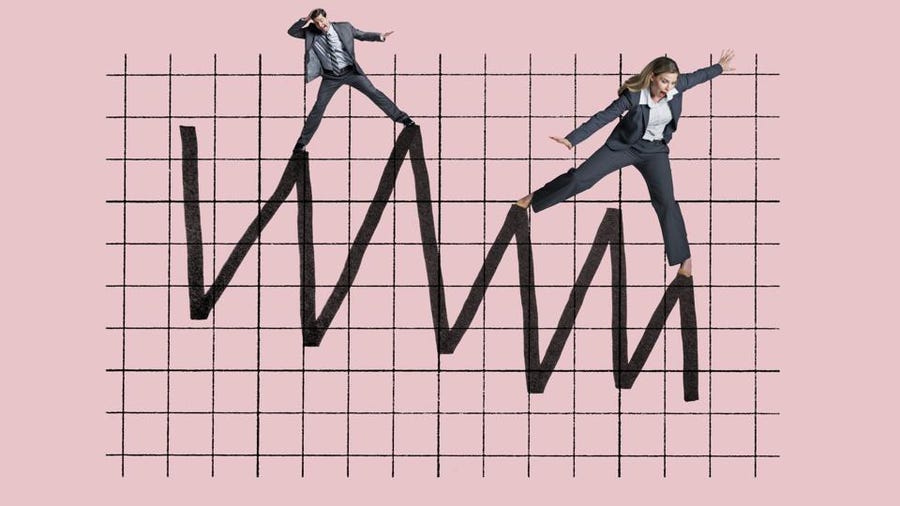The Russell 2000 is a stock market index that tracks the performance of 2,000 small-cap U.S. public companies. Managed by the U.K.-based FTSE Russell Group, the Russell 2,000 is a subset of the Russell 3000 index.
What Is the Russell 2000 Index?
The Russell 2000 index tracks the 2,000 smallest public companies by market cap in its parent Russell 3000 stock index. The remaining 1,000 companies are grouped in the Russell 1000 large-cap stock index.
Because small-cap companies make up a much smaller share of the U.S. stock market than large caps, the companies in the Russell 2000 represent approximately 10% of the U.S. stock market’s total market capitalization. The Russell 1000’s large-cap stocks represent about 92% of the U.S. stock market.
FTSE Russell Group ranks every company in the Russell 3000 based on market capitalization to determine which companies get on each list. It separates the top third into the Russell 1000 and the bottom two-thirds into the Russell 2000.
Every year, FTSE Russell Group rebalances the Russell indexes. Stock markets are dynamic, companies rise and fall in market cap over time, and new companies launch that deserve placement on the indexes.
Between the annual rank day reconstitution, eligible companies that go public through an initial public offering (IPO) and qualify by market cap can be added to the Russell 2000 every quarter. Because of this, the Russell 2000 may sometimes track more than 2,000 stocks.
Russell 2000 Companies
Because they’re much smaller companies, you may be less familiar with members of the Russell 2000. As of June 2022, the top 10 Russell 2000 companies by market cap include:
| Company | Ticker |
|---|---|
| Ovintiv Inc. | OVV |
| Chesapeake Energy Corp | CHK |
| Biohaven Pharmaceutical Holding Ltd | BHVN |
| Antero Resources Corp | AR |
| BJ’s Wholesale Club Holdings | BJ |
| Avis Budget Group | CAR |
| Southwestern Energy Co. | SWN |
| Willscot Corp. | WSC |
| Performance Food Group Co. | PFGC |
| Tetra Tech Inc. | TTEK |
Related Indexes
FTSE Russell Group breaks the Russell 2000 into smaller indexes for investors interested in tracking the performance of particular segments of the small-cap universe. These additional indexes include:
- Russell 2000 Defensive
- Russell 2000 Dynamic
- Russell 2000 Growth
- Russell 2000 Value
- Russell 2000 Growth-Defensive
- Russell 2000 Growth-Dynamic
- Russell 2000 Value-Defensive
- Russell 2000 Value-Dynamic
Russell 2000 vs. Other Indexes
Because it tracks the performance of small-cap stocks, the Russell 2000 serves as a very different benchmark than other major indexes, like the S&P 500 or the Dow Jones Industrial Average (DJIA), which focus on much larger companies.
The intense focus on small-cap companies means the Russell 2000 may show more volatility than these indices because smaller companies have more limited financial resources than big companies and are less equipped to weather negative changes in the overall economy than their larger counterparts. However, with that more significant potential for risk comes built-in greater potential to grow exponentially. It’s easier, after all, to double your value when your stock is worth $10 than when it is worth $100.
Like the S&P 500, many economists consider the Russell 2000 a reasonably accurate barometer of the U.S. economy, particularly as it applies to smaller companies. Moreover, the Russell 2000 is frequently viewed as a bellwether for the economy as the smaller businesses it follows can be the engines of job growth. Tracking them can help economists forecast where the U.S. economy is going.
Russell 2000 vs. S&P SmallCap 600
Unlike its more famous S&P counterpart, the S&P SmallCap 600 tracks smaller companies, similar to the Russell 2000. However, since the S&P SmallCap 600 tracks less than one-third of the number of companies in the Russell 2000, it provides a much narrower understanding of the small-cap market.
For comparison, the S&P SmallCap 600 covers approximately 2.5% of the U.S. stocks by market cap, whereas the Russell 2000 covers about 10%.
How Do You Invest in the Russell 2000?
While investors could recreate the Russell 2000 by individually purchasing shares of each company in the index, it is far easier to simply invest in a Russell 2000 exchange-traded fund (ETF) or index fund that seeks to duplicate the performance of the index.
Several brokerage companies offer Russell 2000 ETFs and index funds. You cannot purchase Russell 2000 funds directly from FTSE Russell Group.
Should You Invest in the Russell 2000?
The Russell 2000 index can be a savvy addition to an investment portfolio, but it’s not necessarily the right choice for everyone.
Since it has such broad exposure, the Russell 2000 offers investors access to the higher-risk/higher-reward world of small-cap investing without overexposure to any one company or industry. That can offer the best of both worlds: a smoother ride for investors while still providing the opportunity for the impressive gains small-cap companies may be better positioned for.
That said, small caps frequently experience more severe price swings than larger companies, meaning white-knuckle investors may find that Russell 2000 funds trigger panic that large-cap indexes do not.
Whether you welcome the higher-risk/higher-reward opportunity, most investors will not want to make Russell 2000 funds a significant portion of their portfolio. Even with the broad exposure of 2,000 companies, the risk inherent to this market segment means it is not necessarily an index on which to stake the majority of your portfolio.
